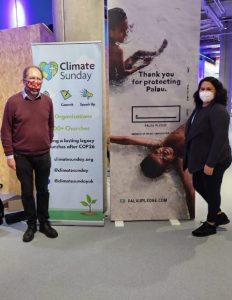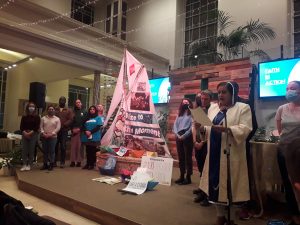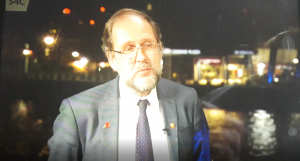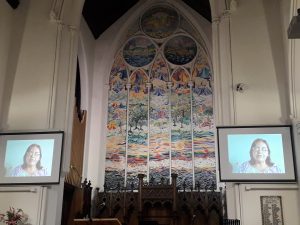WALES AND THE CHURCHES SPEAK UP AT COP26
Report and photos by Gethin Rhys, Cytûn Policy Officer, who attended the conference
At times, the COP26 global climate conference felt like a religious festival. Many of Glasgow’s churches welcomed organisations such as (Cytûn members) Christian Aid, CAFOD and ARocha UK, to set up office space for the negotiations, venues for public events and spaces for the public to worship and pray during the discussions. There was no doubt that thousands of people from all over the world believed that the conference was about God’s Creation, and not just scientific, economic and political issues.
The main negotiations took place in the ‘Blue Zone’ (the Glasgow Events Campus in normal times), which was managed by the United Nations. Cytûn did not have access there, but many of our member organisations were present, and the World Council of Churches. On the other side of the River Clyde was the ‘Green Zone’ (Glasgow Science Centre) where public events and exhibitions were held.

On the first day, November 1, the Climate Sunday coalition established by Churches together in Britain and Ireland had a stand. We showed videos from our partners and photos of several of the 2,200-plus Climate Sunday services held over the past 18 months throughout Britain and Ireland. We had a list of these and many were pleased to see the name of their church there. The video was also shown in the ‘Digital Green Zone’ which was broadcast worldwide throughout the conference, and included a Climate Sunday video in Welsh and English produced for us by Rhodri Darcy of the Union of Welsh Independents. Pictured above is the Climate Sunday stand along with our neighbours from the Republic of Palau, Pacific islands that are among the countries already suffering the worst of the climate crisis. Indeed, in the official discussions on November 2, their President, Surangel Whipps Jr., said, “There is no dignity in a slow and painful death. You might as well bomb our islands instead of making us suffer only to witness our slow and fateful demise.” And yet, the representatives of these islands – the vast majority being Christians – were joyful and dignified neighbours to us in the exhibition hall.

Wales also had its spokespeople, most notably the Youth Climate Ambassadors for Wales, who were a vocal and eloquent presence at many events. Pictured above are several of them with a chair similar to an Eisteddfod chair designed to help people tell and feel the story of climate change. The chair was used in a session organized by Sophie Howe, Future Generations Commissioner for Wales, entitled Climate, in the Visceral Sense: an ongoing story in three acts. The session can be viewed online. The chair will now go to the Welsh Government Cabinet room, to remind members of the government that all their discussions and decisions take place in the context of the climate crisis.

The most visible church presence was in the city. In many Glasgow churches the paper boats made by Christian Aid supporters could be seen, and in a moving ceremony at St George’s Church, Tron, on November 2 these small boats joined the larger boat which had travelled with the pilgrims from the Young Christian Climate Network from the G7 conference in Truro in June to Glasgow. The intention was to present these and commitments from similar organizations around the world to the President of COP26, Alok Sharma MP. Unfortunately, he was not present, but a video message from one of his officials was shown.

The other coalition of which Cytûn is part, Climate Cymru, was also active throughout the conference. On the evening of Sunday November 7 they places an ice sculpture on a disused dry dock in Glasgow, opposite the Blue Zone. Cytûn was represented at the unveiling, and the ice gradually melted during the second week of the conference – like the ice throughout the world which is warming and disappearing. A similar sculpture had been placed on the steps of the Senedd a few days prior to the conference.
I was given the opportunity to reflect on the progress of the conference on Newyddion S4C (picture below from the penultimate evening of the conference) and on Dros Frecwast and Bwrw Golwg on Radio Cymru. Alok Sharma’s own summary of the outcome was that the commitments made at the conference provide some hope of keeping global warming to within 1.5 degrees above the pre-Industrial Revolution temperature – a level that is considered relatively safe for most of the world (although not necessarily for Palau and other Pacific islands). But, said Mr Sharma of that hope, “its pulse is weak”.

The Executive Committee of the World Council of Churches issued a statement at the end of the conference expressing “disappointment and dismay at the inadequate outcome”. As COP26 came to an end civil society representatives marched through the conference hall, led by indigenous peoples from Latin America – peoples who were represented in many of the church activities which took place, including a service arranged by Christian Aid in Sandyford Henderson Church on November 9 (pictured below), which included a livestream from the Amazon.

The World Council of Churches statement said, “The science of climate change is implacable, not amenable to negotiation, and unforgiving of political short-termism,” the statement reads. This is the last crucial decade for climate action to avoid the catastrophe long foretold. In Glasgow our political leaders have once again procrastinated on taking the actions that the climate emergency demands, and diminished the window of opportunity for taking that action.”
The Executive Committee appealed for “a fundamental conversion – a metanoia – in all our nations, societies, churches and communities, away from the destructive exploitative path which has led us to this precipice, towards a just and sustainable future.”
Climate Sunday also published a statement at the end of the conference, saying, “While there have been some welcome agreements reached in Glasgow at COP26, the outcomes of the conference on the whole fell short of what was needed to keep global warming below 1.5 degrees.
“The Climate Sunday coalition urges the UK government to show moral leadership and to take bolder action at home on the climate crisis after COP26. With the likelihood that countries will be asked to ramp up their pledges to cut greenhouse gas emissions within a year – instead of waiting another five – it is urgent that rich countries step up their domestic action before then to be in a position to commit more internationally… The coalition urges churches to keep going on their commitments to environmental action, and to continue to put pressure on the UK government to deliver on its climate responsibilities. Andy Atkins, Chair of Climate Sunday and CEO of A Rocha UK explains: “It is vital that we see COP26 not as the end of global efforts to avoid climate catastrophe, but as a step along the way, with much more yet to be done. Churches have much to offer to address this challenge, and we must use all of our assets – buildings, land, local influence and national voice – to respond. Collectively, churches participating in Climate Sunday have accomplished much, but we have only just begun.” Climate Sunday held a webinar the week following COP26 to share experiences of the conference, and this can be viewed online.
The Church in Wales published a statement, saying “Christians in Wales are welcoming the Welsh Government’s pledge to end oil and gas exploration within the next 15 years. The Church in Wales is commending its decision to sign up to the Beyond Oil and Gas Alliance (BOGA). BOGA is a coalition of 10 nations and regions including Denmark, Costa Rica, France and Ireland who have pledged to end oil and gas exploration by 2035.”
The Bishop of St Davids, Joanna Penberthy, who chairs the Church in Wales’ climate group, CHASE, says, “This is a step in the right direction for Wales and we are delighted the Welsh Government has shown such visionary leadership. The pledge is an example of the necessary action needed at every level of society to stop catastrophic climate change.”
Earlier this year, the Church’s Governing Body committed it to be net zero carbon by 2030. Churches can undertake the straightforward, easy-wins steps in the Church in Wales’ ‘Practical path to net zero carbon’ booklet to set themselves on their own net zero path. The booklet can be found on the Church in Wales’ Climate Change webpage. Churches are encouraged also to:
- continue to use the excellent Climate Sunday resources that will remain available on the Climate Sunday website and to invite other churches of all denominations locally to work together for mutual prayer, support and encouragement.
- register for A Rocha’s Eco-Church project. Could Eco-Church be your church’s Advent Project this year? And you could aim to gain the Bronze award or your next award by next September’s Creation time.
Climate Sunday is encouraging its supporters to take the following steps in the coming weeks:
- Send or sign the Climate Coalition’s Christmas card to Boris Johnson MP
- Write to your MP to ask them to work to ‘keep 1.5 degrees alive’
- Register for the webinar Climate Sunday – What next on January 20 at 7pm.
AN EXPANDED PROGRAMME FOR WELSH GOVERNMENT
On November 22, the Welsh Labour Government and Plaid Cymru announced a Co-operation Agreement for the next three years in the Senedd. The Counsel General, Mick Antoniw MS, explained that Plaid Cymru will have a voice in the implementation of agreed policies and the formulation of Welsh Government budgets, and pledge to support the agreed budgets; but Plaid Cymru will not have ministers in government, and will remain an opposition party in the Senedd.
There are 46 specific commitments, some of which reiterate promises already made in the Welsh Government’s Programme for Government published in June 2021, prioritize within current policies, or are research projects.
Specific new commitments include (quotes italicised):
- Commission independent advice to investigate possible routes to net zero by 2035 – the current target date is 2050.
- Work towards the creation of Ynni Cymru, a publicly owned energy company, over the next two years, to expand community-owned renewable energy generation.
- Work with the farming community to encourage woodland creation on less productive land and through agro-forestry. … We will consider ways of drawing investment for woodland creation that secures local ownership and control.
- Introduce a transition period as we reform the system of farm payments so stability payments will continue to be a feature of the Sustainable Farming Scheme during and beyond this Senedd term.
- Set up an expert group to … create a National Care Service, free at the point of need, continuing as a public service. We will agree an implementation plan by the end of 2023.
- Take immediate and radical action to address the proliferation of second homes and unaffordable housing,…[to] include a cap on the number of second and holiday homes; measures to bring more homes into common ownership; a statutory licensing scheme for holiday lets; greater powers for local authorities to charge council tax premiums and increasing taxes on second homes.
- Establish Unnos, a national construction company, to support councils and social landlords to improve the supply of social and affordable housing.
- Extend free school meals to all primary school pupils
- Expand free childcare for all two-year-olds with a particular focus on providing and strengthening Welsh-medium childcare.
- Work with partners to develop options for a more sustainable model of supply teaching, with fair work at its heart, which will include local authority-led and school-led alternatives and put in place a framework to remove profit from the care of looked after children.
- Fund existing and new enterprises to improve Welsh-based journalism to tackle the information deficit.
- Resume setting Welsh Language Standards for public transport; regulators in the health sector; newly established public bodies currently outside the standards regime and water companies; and begin work on implementing the standards on housing associations.
Only three of the commitments refer to the introduction of new primary legislation, namely:
- • a Senedd Reform Bill, based on 80 to 100 Members; a voting system, which is as proportional – or more – than the current one, and have gender quotas in law.
- • Welsh Language Education Bill, which will … strengthen Welsh in Education Strategic Plans; set new ambitions and incentives to expand the proportion of the education workforce who can teach and work through the Welsh language; establish a single continuum of Welsh language learning; enable existing schools to move into a higher Welsh language category and incentivise …Welsh-medium provision in all education settings.
- • Introduce local tourism levies using local government finance reform legislation, and also Council Tax reform.
A White Paper is also promised to include proposals for a right to adequate housing, the role a system of fair rents (rent control) could have in making the private rental market affordable for local people on local incomes and new approaches to making homes affordable.
STEP BY STEP TOWARDS THE NEW CURRICULUM
Cytûn and its member churches have been actively involved in the planning for a new curriculum for schools in Wales from September 2022. During November, two further steps were taken towards shaping the curriculum for the next generation of children:
• A new draft code for teaching Relationships and Sexuality Education has been laid before the Senedd. The code will need Senedd approval before the Christmas recess, and if that is received, statutory guidance on its implementation will also be issued. The voice of faith communities has contributed to the formulation of the code and guidelines, along with many other voices. The last consultation on the subject received a large amount of input and an analysis of the consultation responses can be read here.
• Qualifications Wales announced their proposals for GCSE syllabuses for the new curriculum, to be examined from 2027 onwards, under the title Qualified for the Future. This involves combining the sciences into one new GCSE, and likewise English language and literature. A decision on Welsh language and literature GCSEs has been deferred, but it is promised that a separate GCSE in Religious Studies will be maintained.
As the Bulletin goes to press, we are still awaiting the outcome of the consultation on a draft Framework for Religion, Values and Ethics in the new curriculum.
Community Payback – an opportunity for churches
Community Payback work is a sentence of the court that requires people to carry out between 40 and 300 hours of work for the benefit of local communities. The number of hours to be completed is set by the Court. Community Payback (CP) is primarily a punishment that restricts a person’s free time, however, CP is also rehabilitative and enables people to pay back for their offending, build self-esteem and learn new skills.
Wales Community Payback provision can support beneficiaries by providing free labour to undertake various projects to support their local communities. The provision does not risk or replace paid employment, rather it supports the completion of work that would not otherwise take place. Each project varies but work can include (but is not limited to):
- • Grounds maintenance/gardening or environmental work
- • Graffiti clearance, collecting litter/clearing fly tipping
- • Minor building work or decorating
Projects are usually delivered by a Community Payback supervisor who will oversee the work of up to 8 people on a project. But where possible, beneficiaries can supervise groups.
Due to COVID-19 restrictions, Community Payback teams have been limited in the number of Unpaid Work hours they have been able to deliver and, as a result, a significant backlog of hours has built up across Wales. Llanbeblig Church, Caernarfon, has already benefited from this project, and the Probation Service in Wales are keen to engage with other third sector organisations who would be interested in benefitting from some of the available Unpaid Work hours, and have set up a functional email box (WalesPS.UPWNominations@justice.gov.uk) to receive enquiries.
WHAT FUTURE FOR CHURCH BUILDINGS IN WALES?
A big post-Covid question for a small corner of the Bulletin! We draw your attention to three things:
- A new report and debate from the National Churches Trust The future of the UK’s Church Buildings, which shows the huge variety of current uses and possible futures.
- A survey by Creative Lives about the issues facing creative groups and venues post-Covid – many of those venues being places of worship and church community halls. The survey closes on December 17th.
- Cytûn member Housing Justice Cymru’s Faith in Affordable Housing programme can offer advice on turning some or all of existing church land and property into affordable housing for the local community and help tackling the housing issues which feature prominently in the new Welsh Government-Plaid Cymru Co-operation Agreement (see page 4).
OPPORTUNITIES TO SHARE EXPERIENCES AND VIEWS
Cytûn is often informed about opportunities for individuals and churches and other organisations to share opinions and experiences on a variety of matters. A list of these opportunities is distributed to our member churches (via church and society officers) on a regular basis. Here are two recent invitations which may be of interest to Bulletin readers:

Transport for Wales has created a new online community called Sgwrs (Chat) to give customers the opportunity to have their say on how we develop and deliver services.
They will be asking participants to help us with things like surveys and take part in live chats to understand their views and opinions on a range of transport-related topics.
To say thanks participants will have access to member-exclusive content; entries into monthly sweepstakes or contests, and further rewards for members who take part in additional activities.
Find out more here.

CONTACTING CYTÛN’S POLICY OFFICER
Parch./Revd Gethin Rhys – Swyddog Polisi/Policy Officer
Cytûn – Eglwysi ynghyd yng Nghymru/Churches together in Wales
Registered office: Room 3.3, Hastings House, Fitzalan Court, Cardiff CF24 0BL
Working at home during the emergency period. Mobile: 07889 858062
E-mail: gethin@cytun.cymru www.cytun.co.uk @CytunNew
Hapus i gyfathrebu yn Gymraeg ac yn Saesneg.
Happy to communicate in Welsh and English
Cytûn is a registered company in England and Wales | Number: 05853982 | Registered name: “Cytûn: Eglwysi Ynghyd yng Nghymru/Churches Together in Wales Limited” | Cytûn is a registered charity | Number: 1117071
Publication date: 29 November 2021. The next Bulletin will be published on 27 January 2022.
